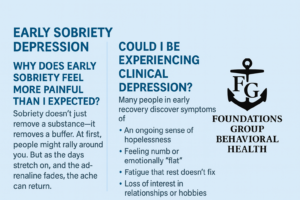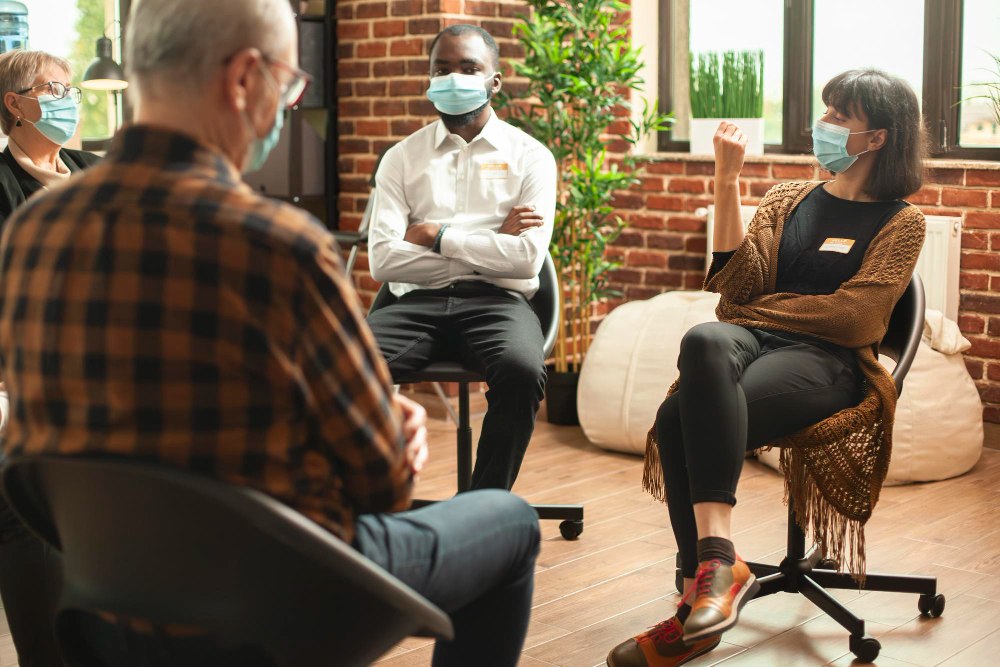You leave the appointment with a piece of paper in your hand—maybe a script, maybe a pamphlet—and a pit in your stomach.
“I think you might benefit from medication.”
Those words echo in your head longer than you expected. You’re not sure whether to feel relieved, ashamed, hopeful, or just scared. And somewhere underneath all that, you wonder quietly: Is this it? Is this all there is to depression treatment?
If you’ve just been diagnosed with depression and you’re unsure about starting medication, you are not alone. You’re not wrong to have questions. And no—you’re not out of options.
At Foundations Group Behavioral Health, we work with people who are newly diagnosed, overwhelmed, or hesitant. Depression treatment can be multi-layered, personalized, and deeply human. Medication can help—but it’s only one part of the picture.
Depression Treatment Is More Than a Pill
When depression is first diagnosed, the focus is often on relief—and medication can absolutely offer that. But a full treatment plan does more than mute symptoms. It helps you build emotional strength, reclaim agency, and feel like yourself again.
This includes:
- Therapy that helps you understand and reshape thought patterns
- Support systems that reduce isolation and build connection
- Routine and structure that help regulate your body and mind
- Medication, when appropriate, to support chemical balance
- Holistic approaches like movement, mindfulness, or creativity
One client put it best: “The medication gave me a ladder. But therapy helped me climb out.”
What Kind of Therapy Helps With Depression?
Therapy isn’t just talking. It’s guided learning—about your thoughts, your nervous system, your patterns, and your pain.
Several evidence-based approaches are used in depression treatment:
- CBT (Cognitive Behavioral Therapy): Helps you identify and shift distorted thoughts (“I’m a burden,” “I’ll always feel this way”) into more accurate, supportive ones.
- DBT (Dialectical Behavior Therapy): Teaches skills like emotion regulation and distress tolerance—especially helpful when depression comes with big emotional swings.
- Trauma-Informed Therapy: Builds safety first, especially if your depression is rooted in past pain that hasn’t been fully processed.
- ACT (Acceptance and Commitment Therapy): Focuses less on “fixing” thoughts and more on learning how to live with them without letting them steer your life.
Many people find that therapy with or without medication helps them rewire how they relate to their own mind. You don’t have to figure it out alone.
What If I Don’t Feel Ready for Medication?
That’s okay. Readiness is part of treatment, too.
You might be scared that medication will change your personality. Or you might worry about side effects, dependency, or what others will think. These are all valid fears—and good therapists and providers will want to talk through them with you.
At Foundations, our clinicians honor your pace. If you’re not ready for meds, we don’t push. If you are ready but nervous, we walk with you through the adjustment process.
What Does a Full Treatment Plan Actually Look Like?
Here’s what a comprehensive depression treatment plan might include:
- Psychiatric evaluation to assess if medication might help (optional, not mandatory)
- Weekly or biweekly therapy sessions, tailored to your emotional needs
- Support groups or peer connection spaces to reduce isolation
- Lifestyle supports like sleep routines, nutrition plans, or movement-based coping
- Holistic therapy elements, such as mindfulness, breathwork, or expressive arts
It’s not a checklist. It’s a roadmap. And you’re the one in the driver’s seat—with a team alongside you for support.
What If I’m Afraid Medication Will Make Me Numb?
Many people are afraid that antidepressants will dull their emotions or flatten who they are.
Here’s the truth: when prescribed thoughtfully, psychiatric medication is not designed to numb you. It’s designed to reduce the intensity of pain—so that therapy, connection, and daily functioning feel more possible.
You’re still you. Just with more room to breathe.
“It didn’t erase my sadness,” one client said. “But it gave me enough space to actually work on it.”
How Long Does Depression Treatment Take?
There’s no one answer—but healing often unfolds in layers. Some people start to feel relief within weeks. Others take longer. What matters most is what is working, and whether your current plan is flexible enough to evolve with you.
At Foundations Group Behavioral Health, we track progress together—so you’re never stuck in a plan that isn’t helping.
Looking for Depression Treatment in Barnstable County or Falmouth, MA?
If you’re based in Barnstable County or Falmouth, you don’t have to travel far to find compassionate care.
Foundations offers flexible outpatient programs in Cape Cod that prioritize human connection, not just prescriptions. We’ll work with you to create a plan that fits—whether you’re ready for medication, unsure, or not ready at all.
FAQs: Understanding Your Options in Depression Treatment
Do I have to take medication if I start therapy?
No. While some people benefit from combining both, therapy alone can be highly effective. Your provider should support whichever path feels safest for you.
What if I try medication and don’t like it?
You can stop—with support. There are many types of antidepressants, and they affect everyone differently. It’s okay to try, adjust, or change your mind.
Can therapy help even if I don’t know what to say?
Yes. Therapists are trained to work with people who feel stuck, quiet, or unsure. You don’t have to have the “right” words to begin.
Is group therapy mandatory?
No. While group therapy helps many feel less alone, it’s not a requirement. Your treatment plan will reflect what you’re comfortable with.
Will this take over my life?
Not at all. Many people attend outpatient depression treatment while working, parenting, or managing school. Your plan will fit around your life—not the other way around.
You’re Allowed to Feel Unsure—And Still Ask for Help
You don’t have to be “on board” with medication to start healing. You don’t have to know exactly what you need. You just need to not stay silent in your suffering.
There is a version of care that will listen to your fears, answer your questions, and adjust as you do.
Call 888-685-9730 or visit our Depression treatment program in Cape Cod, MA to get started—on your terms, and in your time.









